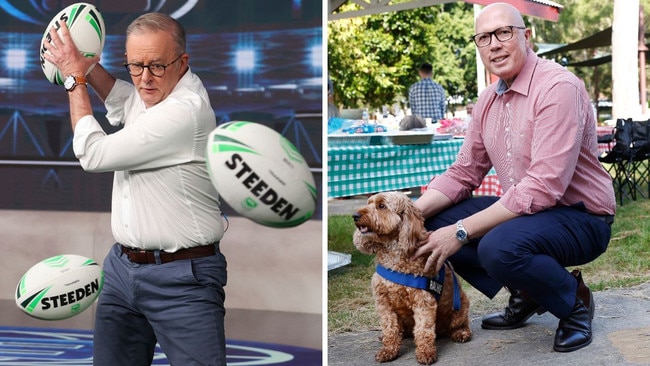Newspoll: Peter Dutton ahead on defence, economy but behind on health and cost-of-living pressures
Peter Dutton is judged better placed to defend the nation and grow the economy but is failing to convince voters on cost-of-living pressures and housing, as Labor’s primary vote lifts and support for both leaders falls.

Peter Dutton is judged the leader better placed to defend the nation and grow the economy, but is failing to convince voters that the Coalition has a superior plan to tackle cost-of-living pressures, housing, tax relief and health services.
An exclusive Newspoll conducted for The Australian shows Labor’s primary vote over the past week lifting to its highest point in more than a year, despite a fall in support for Anthony Albanese.
The Liberal leader has also suffered a further decline in his approval rating and hit a new personal low, as voters back the Prime Minister as better to handle the chaos engendered by US President Donald Trump.

Labor’s primary vote rose a point to 34 per cent following a week dominated by competing housing and tax plans and a new foreign affairs flashpoint over Russia’s ambitions to establish a presence in the region.
This is the highest level of primary vote support for Labor since January 2024 and 1.4 per cent above its last election result.
With the Coalition failing to improve on last week’s primary vote of 35 per cent – 0.7 per cent lower than its May 2022 election result – the margin between the two parties on first preference support now marks the tightest race since October 2023 prior to the failed voice referendum, with just one point separating them.
Despite the slight improvement for Labor over the course of the third week of the election campaign, two-party-preferred vote remains unchanged at 52-48 per cent.
This suggests that while Labor could be in a position to retain a slim majority, if these numbers were reflected on election day, the potential for a hung parliament after May 3 still remains the more likely possibility with the Greens remaining unchanged on 12 per cent, level with that of other minor parties and independents.
Pauline Hanson’s One Nation fell a point to 7 per cent but remains two points higher than the 2022 election result.
The latest Newspoll, conducted between April 14 and April 17 with 1263 voters throughout Australia interviewed online, shows the first movement for Labor’s primary vote in a month. Having been static at 33 per cent for the past three Newspoll surveys, it is now three points higher than it was at the beginning of the year.
The Coalition by contrast has lost four points on its primary vote over the same period, having surrendered almost all of the eight-point primary vote lead it held in January.
Mr Dutton is preferred as the stronger leader when voters were asked to consider who would be better to protect Australia’s defences with a margin of 35 per cent to 23 per cent for Mr Albanese.
The Liberal leader was also considered the better leader for growing Australia’s economy at 34 per cent to 29 per cent.
However, Mr Albanese was ahead of his rival when it came to providing quality healthcare – 42 per cent to 22 per cent – and slightly ahead on the question of helping with cost of living.
On this critical election contest question, Mr Albanese leads Mr Dutton 31 per cent to 28 per cent.
Men favoured Mr Dutton over Mr Albanese on cost of living but women were significantly more likely to favour Labor on this.
Labor’s tax plan also appears to have landed more favourably than the Coalition’s, with Mr Albanese and Labor regarded as better for lowering taxes – 33 per cent to 26 per cent.
With housing supply and affordability featuring as one of the most contested policy areas of the election campaign, 29 per cent of voters nominated Mr Albanese and Labor as better for helping Australians buy their first home compared to 24 per cent for Mr Dutton and the Coalition.
On the question of who was trusted more to lead Australia through the turbulence and uncertainty caused by Mr Trump, 39 per cent nominated Mr Albanese and 32 per cent backed Mr Dutton.
Women were significantly more likely to prefer Mr Albanese on this question, as were those with a university education and those aged under 50.
Mr Dutton was strongly favoured over Mr Albanese among those aged over 65 and those who owned their home outright on all measures with the exception of providing quality healthcare where opinion was almost equally divided.
Both leaders have experienced a fall in approval ratings over the past week as the campaign descended into a slanging match over defence and national security following revelations of Moscow’s overtures to Indonesia about basing military aircraft within range of northern Australia.
Mr Albanese has stretched his lead further as the preferred prime minister, rising three points to 52 per cent and Mr Dutton falling two points to 36 per cent.
Mr Dutton’s dissatisfaction rate rose to 57 per cent, the equal highest level of disapproval for an opposition leader since Bill Shorten in 2018. This gives Mr Dutton a net negative approval rating of minus 22.
Mr Albanese’s approval fell two points to 43 per cent, with his dissatisfaction rating rising three points to 52 per cent.




To join the conversation, please log in. Don't have an account? Register
Join the conversation, you are commenting as Logout